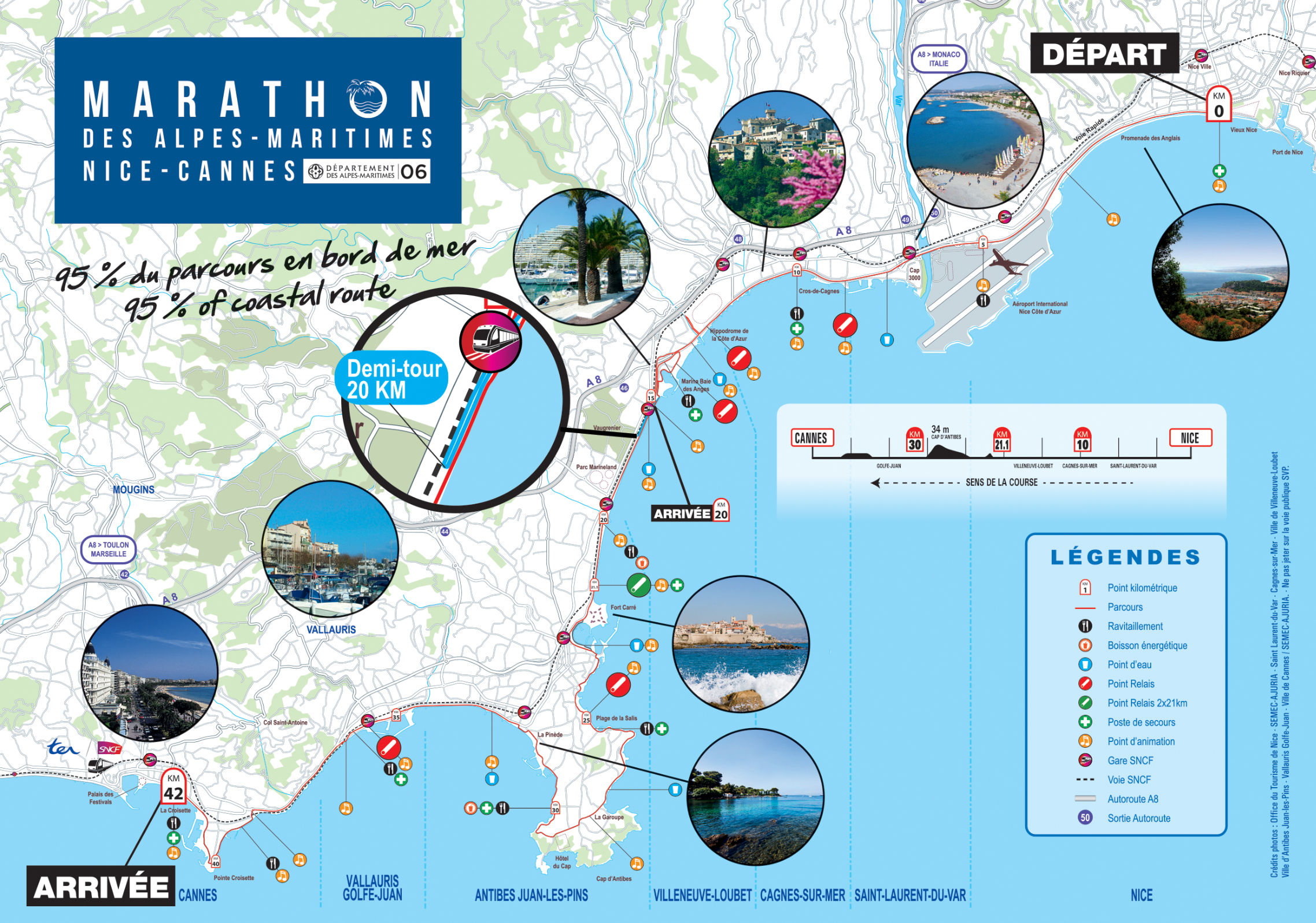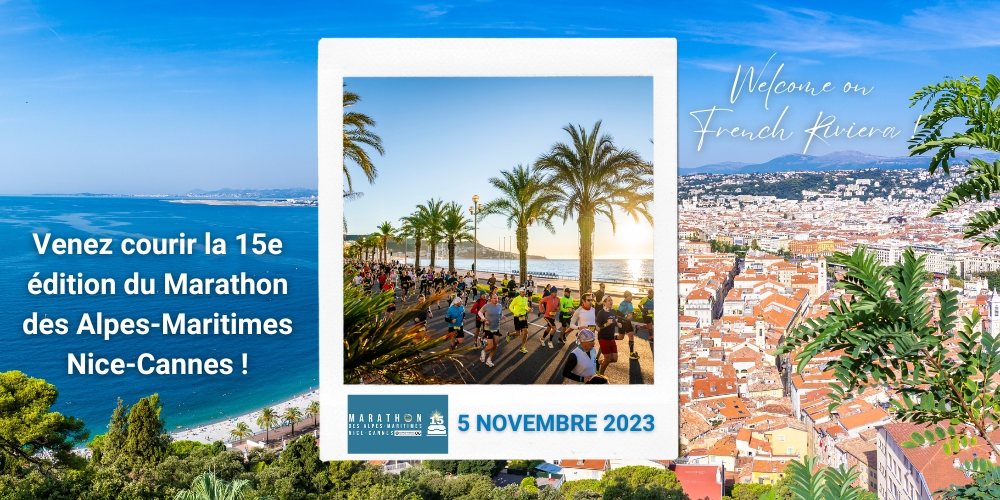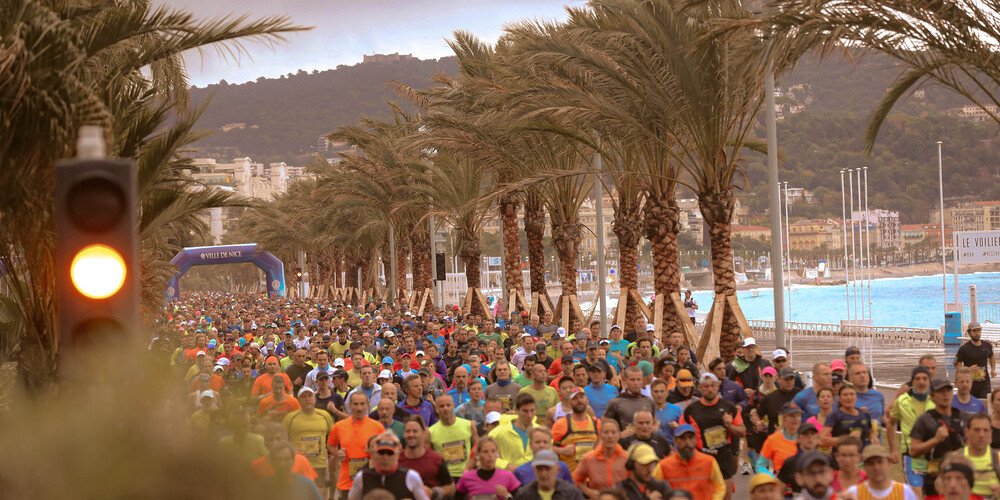The Marathon des Alpes-Maritimes Nice-Cannes is the second most popular marathon in France, just after Paris. With a remarkable course running along 95% of the coastline, it’s a very popular annual event for running enthusiasts. We’ll give you all the information you need to prepare for this event, as well as advice on how to cross the finish line on the Cannes red carpet with a smile on your face.
Topic overview
- Presenting the race
- Preparation and training
- Pacing strategy
- Nutrition
- Hydration during the run
- Packing list and choice of running clothes
- Race registration
Presenting the race
Since its first edition in 2008, participants from all over the world have been admiring the beauty of the Côte d’Azur landscape and enjoying the sunshine and mild Mediterranean climate. This year, the race will celebrate its 15th edition on 5 November 2023, with 12,000 participants and 60,000 spectators expected! Start at 8.00 am from the Promenade des Anglais.
The Marathon des Alpes-Maritimes Nice-Cannes not only offers the chance to run a marathon or the 20km, but also to run in pairs, with the 2x21km race starting in Nice, or to run as part of a team (between 3 and 6 runners) in the relay format.
Preparation and training
When should you start specific training?
Of course, this depends on many different factors. Among other things, your training experience and the fitness level you can rely on at the beginning of your preparation phase. Also, your goals have an influence on the duration of your preparation. In general, we at running.COACH recommend a specific preparation time of 16-20 weeks, i.e. around four to five months.
You can find more on this topic here:
How many weeks of training it takes for a running race?
How many training sessions should you do per week?
How often you train depends on a number of factors: your previous training volume, your running goals, your ambitions and other aspects of your life. Don’t forget that training and recovery need to be balanced.
The following table should help you find the optimum number of training sessions.

If you want to increase your training frequency, it is important to do so slowly and in a controlled manner. We recommend that you increase your training frequency by a maximum of one session per week per six months. This will allow your body to adapt to the additional load and minimize the risk of injury and overload.
Which sessions should I include in my preparation for the Marathon Nice-Cannes?
Vary your sessions during the training week. For example, include regular intensive running sessions in your weekly schedule (from 5 sessions per week, you can easily include two intensive sessions). You should also do one long run per week. The remaining sessions are filled with endurance runs and recovery runs.
The duration of the long jogs should be between 75 min and 180 min for marathon preparation. Vary the duration from week to week by cycling your training.
Example: Week 1: 75min, Week 2: 120min, Week 3: 140min, Week 4: 160min, Week 5: 180min – restart the cycle afterwards. The intensity should be slightly lower than for an endurance run.
How should the workouts be distributed throughout the week?
The intense and long runs are considered key units by running.COACH. In order to perform them with the highest possible quality, you should always include at least one day with a break / endurance run / regeneration run between two key units.
Of course, the easiest way is to let running.COACH generate the plan automatically. This way you will also get the optimal training pace suggested: www.runningcoach.me
Preparation races for the Marathon Nice-Cannes
To prepare for the Marathon Nice-Cannes, it makes sense to include a few test races in your training. These can be selected as follows:
- 3-4 preparation races spread over the last 20 weeks of preparation.
- Half marathon as a “compulsory element”, ideally four weeks before the main competition.
- Last race 14 days before the main competition, maximum 10 km.
- Race distances increase towards the competition, final race shorter. E.g. 10 km, 15 km, half marathon, 10 km and main race.
You can find a calendar with interesting races here.
Pacing strategy
The marathon consists of 42.195 km of pure pleasure, with a legendary start on the Promenade des Anglais in Nice and an exceptional finish on the Boulevard de la Croisette in Cannes. It includes 173 metres of positive ascent.

Our running calculator can help you with your pacing strategy: running.COACH calculator.
Here you can create a pacing table based on times run at other events, which will give you a pace for each kilometer depending on the course profile.
Check your kilometer times at regular intervals during the run – especially at the beginning of the run you tend to start a little faster than planned due to the increased adrenaline level and the course profile.
Nutrition
When it comes to nutrition before training, there are a few things to keep in mind:
- The optimal time for the last meal is 3 hours before training. In order to keep as little energy as possible in the digestive tract, easily digestible carbohydrates are recommended and fresh and unprocessed foods such as vegetables and whole grains are discouraged.
- 1-2 hours before exercise: If you only eat in the last 2 hours before exercise, lighter meals such as a small low-fat sandwich with white bread, sports bars, rice cakes or a small ripe banana are suitable.
You can find more on this topic here.
Tips for race day:
- Breakfast: Ideally 3 hours before the start and without “surprises”. Carbohydrates should be the central element. The consumption of fats and proteins should be limited, as they can lead to gastrointestinal problems due to slower digestibility during the race.
- During the race: For endurance races lasting longer than one hour, it is recommended to replenish the micronutrients (especially carbohydrate reserves) lost during the race. This can be achieved through various foods such as sports drinks, gels, solid food, energy bars or chewable tablets. The aim is to provide immediate energy (we recommend maltodextrin-based products). Be sure to test your food intake during the race in training!
Further details and tips can be found here.
Hydration during the run
Fluid intake during the run becomes more important after an hour of running. On the one hand, dehydration can be directly dangerous, but on the other hand, a lack of fluids also leads to less efficient transport of oxygen and thus to a reduced performance of the muscles.
Before the run:
Try to fill the stores without overdoing it. We recommend drinking 500ml of sports drink (6-8% carbohydrates) 1-2 hours before the start – preferably in portions.
You can drink another 3 dl during the warm-up (the activation of the body prevents the fluid from going directly into the bladder).
During the run:
The additional fluid requirement generated by running can be calculated as follows:
KG body weight x KM distance = ML fluid
A person weighing 70 kilograms will consume almost 3 liters of additional fluid (above normal consumption) during the Marathon Nice-Cannes. The longer the running time, the greater the proportion that should be replenished during the race. It is important to remember that the body can absorb a maximum of 2dl of fluid every 15 minutes. Anything drunk in excess of this will be carried along “unnecessarily”.
It makes sense to consume drinks containing electrolytes and carbohydrates.
Further details and tips can be found here.
Packing list and choice of running clothes
To make sure you don’t forget anything, we recommend you take a look at our packing list.
You can see from our table which clothes we recommend for which conditions.

Race registration
Not yet on the Nice-Cannes Marathon start list? Then click here to change it. Registration is open until 30 October 2023.
We wish you good luck with your training for the Marathon Nice-Cannes. Don’t forget that we can prepare a 100% personalised training plan to help you achieve your goals.


